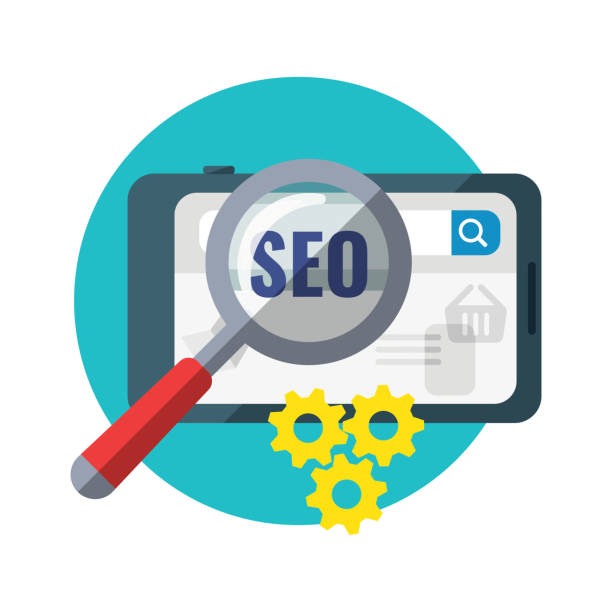What is SEO and why is it important?

What is SEO and why is it important?
SEO (Search Engine Optimization) is the process of optimizing your website for search engines like Google, Bing, and Yahoo to achieve higher rankings in search results.
The higher your website ranks in search results, the more likely users are to click on it and visit your website.
The importance of SEO can be examined from several aspects:
- Increase Organic Traffic Organic traffic refers to visitors who come to your website through search results.
SEO helps you attract more organic traffic, which is typically of higher quality than traffic from advertisements. - Increase Credibility and Trust Websites that rank high in search results are usually perceived as more credible and trustworthy by users.
- Improve User Experience The SEO process also includes improving the user experience (UX) of a website.
A website with a good user experience engages users more and increases their likelihood of returning. - Reduce Marketing Costs Compared to other marketing methods like paid advertising, SEO can be a more cost-effective strategy for attracting customers.
In summary, SEO is a long-term investment that can help you increase your online visibility, attract more traffic, boost your credibility, and ultimately, grow your business.
Are you bothered by losing customers who visited your site to buy?
Rasweb is your specialized solution for a successful online store.
✅ Significant increase in your online sales
✅ Building trust and professional branding with customers⚡ Get free consultation from Rasweb experts!
Key Concepts in SEO

Key Concepts in SEO
To begin with SEO, it is essential to be familiar with the key concepts in this field.
Below, we refer to some of the most important concepts:
- Keywords are the words and phrases users enter into search engines to find the information they need.
Keyword research and selecting appropriate keywords are among the most important steps in SEO.
(Google Search Console) - On-Page SEO refers to a set of actions performed within your website to optimize it for search engines.
These actions include optimizing content, title tags, meta descriptions, URL structure, and so on. - Off-Page SEO refers to a set of actions performed outside your website to increase its authority and ranking.
These actions include link building, social media marketing, branding, and so on. - Link Building is the process of acquiring links from other websites to your website.
Links are considered a vote of confidence by search engines, and the more high-quality incoming links your website has, the higher its ranking will be. - Content Content is king! Producing high-quality, valuable, and keyword-relevant content is one of the most important factors for success in SEO.
- User Experience (UX) Search engines place great importance on your website’s user experience.
A website with a good user experience will have a low bounce rate, high dwell time, and a high conversion rate.
Understanding these key concepts will help you design and implement an effective SEO strategy for your website.
Keyword Research: A Crucial Step

Keyword Research: A Crucial Step
Keyword research is the cornerstone of any successful SEO strategy.
Without keyword research, you won’t know exactly what users are looking for and how you can optimize your website to meet their needs.
You can use ahref’s site for this purpose.
Steps for Keyword Research
- Define Business Goals Before starting keyword research, you need to define your business goals.
Do you want to attract more traffic? Increase sales? Boost brand awareness? - Create a List of Related Topics Create a list of topics related to your business.
These topics can be broad or specific. - Use Keyword Research Tools Use keyword research tools like Google Keyword Planner, Ahrefs, SEMrush, and Keywordtool.io to find keywords related to your topics.
- Analyze Keywords Analyze the found keywords based on search volume, competition, and relevance to your business.
- Select Target Keywords Based on the analysis, choose your target keywords.
Target keywords should have a suitable search volume, lower competition, and be relevant to your business.
When conducting keyword research, pay attention to the following:
- Search Intent What is the user’s intent when searching? Is the user looking for information? Do they want to buy something? Do they want to solve a problem?
- Competition Which websites are competing for your target keywords? Can you compete with them?
- Relevance Keywords must be relevant to your website’s content.
Using irrelevant keywords can lead to your website being penalized by search engines.
By conducting thorough keyword research and selecting appropriate target keywords, you can attract more traffic to your website and improve your ranking in search results.
| Keyword | Monthly Search Volume | Competition Level |
|---|---|---|
| SEO Training | 1500 | Medium |
| Website Optimization | 1200 | High |
| Increase Website Traffic | 900 | Medium |
This table is an example of how to organize and display keyword research data.
You can also add other columns such as “Cost Per Click” (CPC) or “Conversion Rate” to the table.
On-Page SEO: Content and Website Structure Optimization

On-Page SEO: Content and Website Structure Optimization
On-page SEO involves optimizing various elements of your website so that search engines can easily understand your content and rank it in search results.
The two main aspects of on-page SEO are content optimization and website structure optimization.
Content Optimization
- Keyword Usage Naturally use your target keywords in titles, meta descriptions, body text, and image alt tags.
Avoid excessive use of keywords, as this can lead to your website being penalized by search engines. - Writing Quality Content Your content should be valuable, engaging, and relevant to users’ needs.
Quality content engages users more and increases their likelihood of returning. - Image Optimization Describe your images using alt tags.
Alt tags help search engines understand the content of your images. - Using Heading Tags Use heading tags (H1 to H6) to organize your content.
The H1 tag should be the main title of the page, and H2 to H6 tags should be used for subheadings.
Website Structure Optimization
- URL Structure Your website’s URL structure should be logical and easy to understand.
Use keywords in the URLs of your pages. - Navigation Your website’s navigation should be easy and intuitive.
Users should be able to easily find the pages they are looking for. - Loading Speed Your website’s loading speed should be fast.
Users typically don’t wait for a slow website to load. - Responsive Design Your website should be optimized for various devices (desktop, tablet, mobile).
By optimizing your content and website structure, you can help search engines better understand your website and improve its ranking in search results.
Is your company’s website performing as well as your brand deserves? In today’s competitive world, your website is your most important online tool. Rasweb, an expert in professional corporate website design, helps you to:
✅ Gain customer credibility and trust
✅ Convert website visitors into customers
⚡ Get a free consultation!
Off-Page SEO: Increasing Authority and Link Building

Off-Page SEO: Increasing Authority and Link Building
Off-page SEO refers to a set of actions performed outside your website to increase its authority and ranking.
The most important aspect of off-page SEO is link building.
Link Building
Link building is the process of acquiring links from other websites to your website.
Links are considered a vote of confidence by search engines, and the more high-quality incoming links your website has, the higher its ranking will be.
Link Building Methods
- Creating Quality Content The best way to earn links is to create high-quality, valuable content that other websites will want to link to.
- Guest Blogging Write articles for other websites and, in return, receive a link to your website.
- Participating in Forums and Groups Participate in forums and groups related to your industry and answer users’ questions.
If necessary, link back to your website. - Connecting with Influencers Connect with influencers in your industry and ask them to share your content or link to it.
- Broken Link Building Find broken links on other websites and suggest to the website owners that they replace the broken link with a link to your website.
Important Tips for Link Building
- Quality over Quantity Instead of acquiring many low-quality links, focus on acquiring links from authoritative and relevant websites.
- Diversity Get links from various sources.
- Relevance Links should be relevant to your website’s content.
- Anchor Text Anchor text is the text that links to your website.
Use relevant keywords in the anchor text, but avoid over-optimization.
Link building is a time-consuming and challenging process, but with effort and perseverance, you can acquire high-quality links that will help improve your website’s ranking in search results.
User Experience and Its Impact on SEO

User Experience and Its Impact on SEO
User Experience (UX) refers to the feelings users have when using your website.
A website with a good user experience keeps users satisfied and encourages them to stay longer on your site, view more pages, and ultimately convert into customers.
SEO and UX are closely intertwined.
Search engines place great importance on your website’s user experience, and websites with a better user experience generally achieve higher rankings in search results.
Factors Affecting User Experience
- Loading Speed Your website’s loading speed should be fast.
Users typically don’t wait for a slow website to load. - Responsive Design Your website should be optimized for various devices (desktop, tablet, mobile).
- Navigation Your website’s navigation should be easy and intuitive.
Users should be able to easily find the pages they are looking for. - Content Your website’s content should be high-quality, valuable, and relevant to users’ needs.
- Readability Your website’s text should be readable and understandable.
Use appropriate fonts, suitable font sizes, and enough spacing between lines. - Accessibility Your website should be accessible to all users, including those with disabilities.
How to Improve User Experience?
- Research Research your users and understand their needs and desires.
- Testing Test different changes on your website and see which changes improve user experience.
- Feedback Get feedback from your users and ask them to share their experience on your website.
- Optimization Continuously optimize your website based on user feedback and test results.
By improving your website’s user experience, you can attract more users, keep them satisfied, and ultimately improve your website’s ranking in search results.
Competitor Analysis in SEO

Competitor Analysis in SEO
Competitor analysis is one of the most important stages of SEO.
By analyzing competitors, you can identify their strengths and weaknesses and use them to improve your own SEO strategy.
Steps for Competitor Analysis
- Identify Competitors Identify your main competitors.
These are websites that rank for keywords similar to yours in search results. - Keyword Analysis Identify the keywords for which your competitors are ranking.
Use keyword research tools like Ahrefs and SEMrush for this purpose. - Content Analysis Examine your competitors’ content.
What type of content do they produce? How high-quality is their content? - Link Analysis Examine the incoming links to your competitors’ websites.
Which websites have linked to them? - User Experience Analysis Examine the user experience of your competitors’ websites.
How fast does their website load? How easy is their navigation?
How to Use Competitor Analysis?
- Identify Opportunities By analyzing competitors, you can identify opportunities to improve your SEO strategy.
For example, you might notice that your competitors are not ranking for certain keywords. - Learn from Competitors’ Mistakes By analyzing competitors, you can learn from their mistakes and avoid repeating them on your own website.
- Improve Content Strategy By analyzing competitors’ content, you can find new ideas for content creation.
- Improve Link Building Strategy By analyzing incoming links to competitors’ websites, you can find new websites for link building.
Competitor analysis is an ongoing process.
You should regularly analyze your competitors to stay aware of changes in your industry and adjust your SEO strategy accordingly.
Essential SEO Tools

Essential SEO Tools
SEO tools help you make your website optimization process simpler and more effective.
There are many SEO tools available, but some are more essential than others.
Essential Tools
- Google Search Console is a free tool from Google that provides you with valuable information about your website’s performance in search results.
Using this tool, you can identify issues such as crawl errors, broken links, and mobile problems. - Google Analytics is a free tool from Google that provides you with comprehensive information about your website’s traffic.
Using this tool, you can understand where users come from, which pages they visit, and how long they stay on your website. - Google Keyword Planner is a free tool from Google that helps you find suitable keywords for your website.
Using this tool, you can check search volume, competition level, and bid estimates for keywords. - Ahrefs is a paid tool that provides you with comprehensive information about links, keywords, and your competitors.
Using this tool, you can improve your SEO strategy and increase your website’s ranking in search results. - SEMrush is a paid tool that offers similar information to Ahrefs.
- Screaming Frog SEO Spider is a free (with limitations) tool that helps you audit your website for SEO issues.
Using this tool, you can identify crawl errors, broken links, and issues with title tags and meta descriptions.
In addition to these tools, there are other tools that can assist you in the SEO process.
For example, website speed optimization tools, responsiveness testing tools, and content generation tools.
| Tool | Usage | Free/Paid |
|---|---|---|
| Google Search Console | Checking site performance in Google | Free |
| Google Analytics | Analyzing site traffic | Free |
| Ahrefs | Competitor and link analysis | Paid |
| SEMrush | Competitor and keyword analysis | Paid |
Are you worried that your company’s old website will drive away new customers? Rasweb solves this problem with modern and efficient corporate website design.
✅ Increases your brand’s credibility.
✅ Helps attract targeted customers.
⚡ Contact Rasweb for a free consultation!
Common SEO Mistakes and Their Solutions

Common SEO Mistakes and Their Solutions
Even with sufficient knowledge about SEO, you might make mistakes that harm your website’s ranking.
Here are some common SEO mistakes and their solutions:
- Ignoring Keyword Research If you ignore keyword research, you might optimize for inappropriate keywords that attract little traffic.
- Overuse of Keywords Excessive use of keywords (Keyword Stuffing) can lead to your website being penalized by search engines.
- Producing Low-Quality Content Low-quality content does not satisfy users and does not encourage them to stay longer on your website.
- Ignoring Image Optimization Image optimization can help improve your website’s loading speed and its ranking in search results.
- Lack of Mobile Optimization Failure to optimize for mobile can lead to a decrease in your website’s traffic and ranking.
- Ignoring Link Building Link building can help increase your website’s authority and its ranking in search results.
- Linking to Low-Quality Websites Linking to low-quality websites can harm your website’s ranking.
- Ignoring User Experience Ignoring user experience can lead to a decrease in your website’s traffic and ranking.
- Failure to Track and Analyze Results Failure to track and analyze results can cause you to fall behind changes in search engine algorithms and competition with your rivals.
Solutions
- Perform Keyword Research Before starting any SEO campaign, conduct keyword research.
- Natural Keyword Usage Use keywords naturally in your content and avoid over-optimization.
- Produce Quality Content Produce high-quality, valuable content relevant to users’ needs.
- Optimize Images Describe your images using alt tags and optimize them for the web.
- Optimize for Mobile Optimize your website for mobile.
- Build Links from Authoritative Websites Acquire links from reputable and relevant websites.
- Improve User Experience Improve your website’s user experience.
- Track and Analyze Results Regularly track and analyze the results of your SEO campaign.
Local SEO for Local Businesses

Local SEO for Local Businesses
Local SEO refers to optimizing your website and online business profile to attract local customers.
If you have a local business, local SEO can help you get seen in local search results on Google and other search engines.
Why is Local SEO Important?
- Attracting Local Customers Local SEO helps you attract local customers who are looking for your products and services in your area.
- Increasing Website Traffic Local SEO can help increase your website traffic through local searches.
- Increasing Sales Local SEO can help increase your sales by attracting local customers.
- Building Brand Awareness Local SEO can help build your brand awareness among local customers.
Important Actions in Local SEO
- Create and Optimize Your Google My Business Profile Create and optimize your Google My Business profile.
This profile is displayed in local Google search results. - Register Your Business in Local Directories Register your business in local directories such as Yelp, Foursquare, and Citysearch.
- Optimize Your Website for Local Keywords Optimize your website for local keywords.
For example, if you are a restaurant in Tehran, optimize your website for keywords such as “restaurant in Tehran”. - Acquire Customer Reviews Ask your customers to review your business.
Positive customer reviews can help improve your ranking in local search results. - Create Local Content Create local content.
For example, you can write about local events, local news, and local attractions.
By taking these actions, you can improve your business’s local SEO and attract more local customers.
Frequently Asked Questions
| Question | Answer |
|---|---|
| What is SEO? | SEO, or Search Engine Optimization, is the process of increasing the quality and quantity of website traffic by improving the site’s ranking in organic search results of search engines like Google. |
| What are the main types of SEO? | SEO is divided into three main categories: On-Page SEO, Off-Page SEO, and Technical SEO. |
| What does On-Page SEO include? | On-Page SEO involves optimizing elements within the website, such as keywords, Title Tags, Meta Descriptions, content, URL structure, images, and internal links. |
| What is Off-Page SEO? | Off-Page SEO refers to activities outside the website that help improve its ranking, such as Backlink Building, social media marketing, and Brand Mentions. |
| What is Technical SEO? | Technical SEO focuses on optimizing the technical aspects of a website to help search engines crawl and index it more effectively. This includes site speed, mobile-friendliness, site structure, Sitemaps, and the Robots.txt file. |
| What role do Keywords play in SEO? | Keywords are the phrases users enter into search engines. Correct and targeted use of relevant keywords in content and site elements helps search engines understand the topic of your page and display it for relevant searches. |
| What is a Backlink and why is it important? | A backlink, or inbound link, is a link from one website to another. Backlinks act as a “vote of confidence” from other sites for search engines and play a significant role in a site’s authority and ranking, especially if they come from reputable sites. |
| What is the impact of quality content on SEO? | High-quality, relevant, comprehensive, and unique content not only attracts and retains users but also shows search engines that your page is valuable. This helps improve rankings, reduce bounce rate, and increase user dwell time on the site. |
| Why is site loading speed important for SEO? | Site loading speed is an important ranking factor for Google. Faster sites offer a better user experience, have lower bounce rates, and are preferred by search engines. |
| Is SEO a one-time process? | No, SEO is a continuous and long-term process. Search engine algorithms are constantly changing, competition is increasing, and site content also needs updating. Therefore, SEO requires continuous monitoring, analysis, and optimization. |
And other services of Rasweb Advertising Agency in the field of advertising
- Smart UI/UX: A combination of creativity and technology for digital branding using real data.
- Smart SEO: A fast and efficient solution for online growth with a focus on precise audience targeting.
- Smart Direct Marketing: A dedicated service for growing user engagement based on intelligent data analysis.
- Smart Digital Advertising: A blend of creativity and technology to increase sales through an SEO-driven content strategy.
- Smart Content Strategy: Designed for businesses seeking to manage campaigns through the use of real data.
And over hundreds of other services in the field of internet advertising, advertising consultation, and organizational solutions.
Internet Advertising | Advertising Strategy | Advertorials
Resources
Comprehensive SEO Training at Websima
SEO Articles at Seokar
SEO Guide for Beginners at Zhaket
Advanced SEO Tips at Novin
💡 Take your business to the top with Rasweb Afarin Digital Marketing Agency’s services! At Rasweb Afarin, we specialize in providing comprehensive digital solutions for the growth and development of your business. From professional website design and SEO to social media management and targeted advertising campaigns, we provide everything you need to be seen and succeed in the online space.
📍 Tehran, Mirdamad Street, next to Bank Markazi, Kazerun Jonubi Alley, Ramin Alley, No. 6




